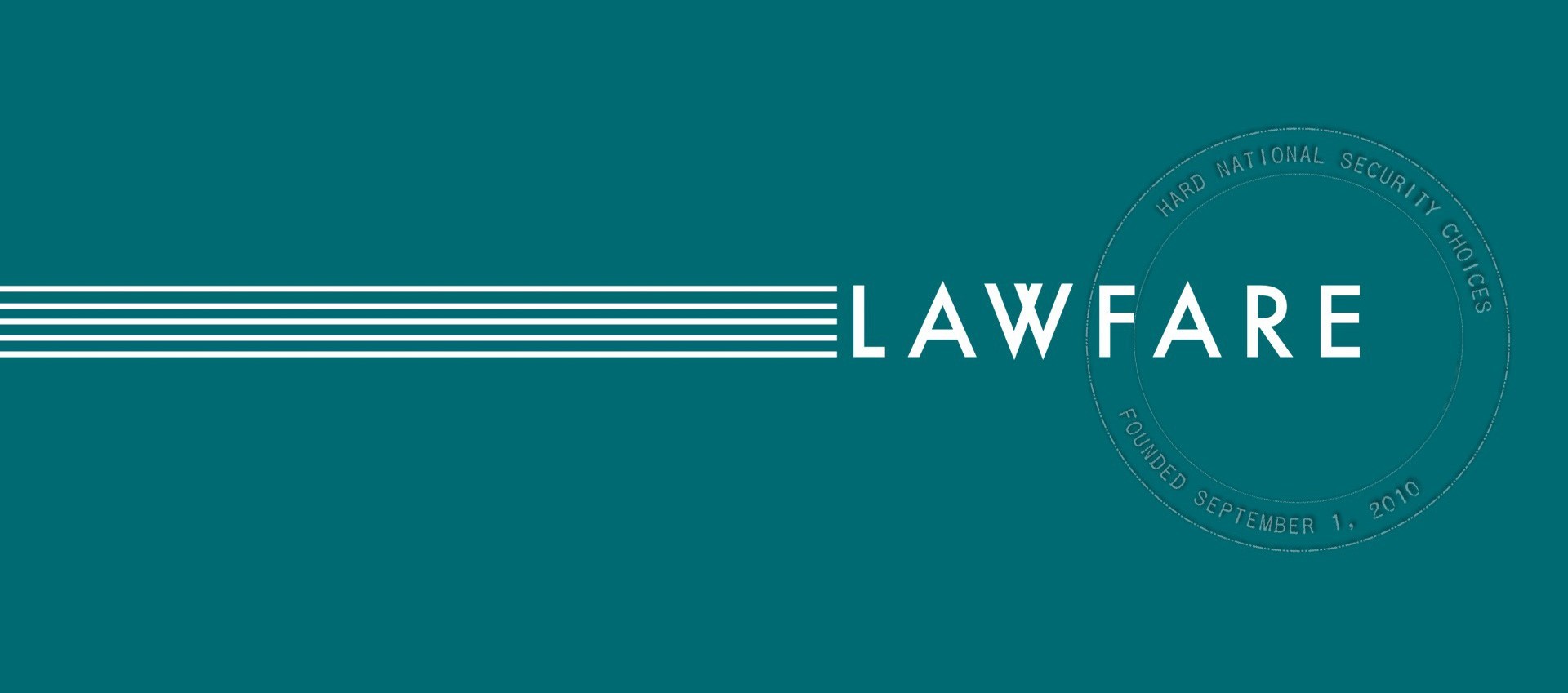The Week That Was: All of Lawfare in One Post

Published by The Lawfare Institute
in Cooperation With

Scott R. Anderson, Anna Bower, Hyemin Han, Tyler McBrien, Roger Parloff, Stephanie Pell, Katherine Pompilio, Alan Z. Rozenshtein, and Benjamin Wittes discussed the recent indictment of former President Donald Trump in the Justice Department’s Mar-a-Lago probe. They explained the indictment’s allegations and charges, the assignment of Judge Aileen Cannon to the case and its possible implications, potential penalties, next steps, and more.
Bower detailed her first-hand account of former President Donald Trump’s arraignment on Tuesday afternoon.
Matt Tait discussed the 31 different documents cited in the Justice Department’s indictment of former President Trump. He analyzed the document’s classifications—top secret, secret, or confidential—and the information they most likely contain, ranging from U.S. nuclear capabilities to foreign government support of terrorist acts against the United States and more.
Pompilio shared the full transcript of former President Donald Trump’s arraignment last week in Miami, where he pleaded not guilty to 37 federal charges.
On the Lawfare Podcast, Wittes and Jurecic sat down with Bower to discuss the details of Trump’s arraignment in Florida. Bower spoke about her experience in the courtroom, Trump’s conditions of release, his counsel, and the 27-hour line to enter the courthouse. You can watch a live recording of the podcast here.
On the Lawfare Podcast, Wittes sat down with Bower and Tait to conduct a line-by-line, page-by-page analysis of the most recent indictment against Trump in the Mar-a-Lago classified documents case. They discussed where the indictment is strongest, where and which issues it raises, and the potential future of the case.
Heidi Kitrosser compared the Trump administration’s use of the Espionage Act against leakers to the act’s possible application to former President Donald Trump in an eventual trial. She argued that Trump’s indictment reveals the need for an amended version of the Espionage Act that makes the public’s interest in leaked information a more relevant factor.
On the Lawfare Podcast, Wittes sat down with Kitrosser to discuss the Espionage Act, its history, and common criticisms, as well as why the act’s most frequently raised issues will not apply in Trump’s eventual federal trial. They cover previous prosecutions of media, leakers, and spies, and provide context to understand the Espionage Act’s role in the charges against Trump.
Parloff explored possible applications of the “silent witness rule” to Trump’s future trial. He analyzed past cases involving the silent witness rule and concluded that special counsel Smith will have to construct a silent witness rule proposal that protects national security secrets and Trump’s constitutional rights while preventing a damaging precedent that could jeopardize future Espionage Act prosecutions.
On the Lawfare Podcast, Wittes sat down with Brian Greer to discuss the Justice Department’s options for presenting the charges filed last week against Trump, whether they can be declassified, if the department can use the “silent witness rule,” and more.
Anderson explored the possibility of additional charges against Trump and his associates based on information in the indictment that was unsealed last week. He argued that federal prosecutors may have grounds to file additional charges against Trump and other co-conspirators in connection with the removal of classified documents from the White House, Trump’s disclosure of classified information to individuals without security clearance, and further unlawful retention of classified documents.
Han considered Trump’s theory that consistent investigations and legal actions against him are a politically-motivated “witch hunt.” She reviewed the connective tissue between the many cases against Trump (past, present, and likely to come) and the interplay of legal and political processes within the U.S. justice system that may lead to this impression—though ultimately concluding that the theory is wrong.
On Rational Security, Anderson, Jurecic, and Rozenshtein sat down with Bower to discuss Trump’s arraignment, possible additional charges against Trump or others, a Chinese spy station in Cuba, and more.
On Aftermath, Episode 6: Going Dark: Natalie Orpett delved into the behind-the-scenes elements of the Jan. 6 committee’s investigation, exploring the committee’s extensive legal battles to prove that Trump and his allies attempted to shatter the foundation of American democracy.
Anna Hickey announced that on Tuesday, June 20 at 3pm ET, Wittes and Pompilio will sit down with Orpett and Ian Enright to mark the release of the first season of The Aftermath. They will discuss the purpose of the series, episode production, and more. Material supporters on Patreon and Substack will receive a link to join a Zoom webinar, and the event will be livestreamed on YouTube for all other viewers.
Han shared the indictment of U.S. Air National Guard member Jack Teixeira. He has been charged with six counts of willful retention and transmission of classified information regarding national security.
McBrien shared former Vice President Mike Pence’s unsealed motion to quash the grand jury subpoena requiring him to provide testimony before a grand jury about the Jan. 6, 2021, insurrection and other efforts to overturn the 2020 presidential election.
Pompilio shared a ruling from the U.S. Court of Appeals for the District of Columbia Circuit granting a stay of the previous ruling in U.S. v. Joseph W. Fischer—a decision that allowed the government to charge more than 300 Jan. 6 rioters with obstruction of an official proceeding.
Brian Nussbaum discussed how the challenges of regulating money laundering and financial crime serve as a model for potential difficulties in the global regulation of artificial intelligence. He argued that a cross-national, multidisciplinary effort is required to prevent offshoring AI, similar to the multilateral approach for preventing financial crime.
John Butler and Steve Stransky explained the new National Institute of Standards and Technology proposal to update Special Publication (SP) 800-171, which serves as a key cybersecurity standard for both government contractors and non-government businesses. They concluded that the proposal emphasizes the need for businesses to amend their incident response plans to coincide with changes in legal cyber incident reporting obligations, including federal and state changes to information security laws and data breach reporting timelines.
Pompilio shared a recently-declassified report from the Office of the Director of National Intelligence. The report reveals that members of the U.S. intelligence community are collecting a significant amount of commercially available information that poses counterintelligence and privacy risks.
Eugenia Lostri shared a criminal complaint from the Justice Department announcing charges against 20-year old Russsian national Ruslan Magomedovich Astamirov. He has been charged on two counts–conspiring to commit wire fraud and conspiring to intentionally damage protected computers and to transmit ransom demands–in relation with the LockBit ransomware campaign.
Kyle Fendorf discussed the IT Army, a Ukrainian hacktivism group that congregates on Telegram to participate in patriotic hacking campaigns. He examined the operations of the IT Army and concluded that the group’s offensive cyber attacks targeting civilian sectors have shifted international norms.
In this week’s installment of Lawfare's Foreign Policy Essay series, Bradford Dismukes and Barry Blechmen argued that, in response to Russia’s frequent manipulation of the Black Sea Grain Initiative, a near-shore shipment corridor should be established in the Black Sea and defended by Ukraine and NATO. They also asserted that Ukraine should initiate a counter-blockade of Russian naval forces, and an international convention should be proposed to guarantee an uninhibited export of the region’s grain and other food provisions.
Han shared a Justice Department report that identifies routine unconstitutional practices committed by the Minneapolis Police Department—the same department whose officers killed George Floyd on May 25, 2020.
On Chatter, David Priess sat down with Peter Gleick to discuss Gleick's interest in hydrology, the importance of interdisciplinary studies for water issues, early legal codes' attention to water conflict, and more.
And on the Lawfare Podcast, McBrien sat down with Michael Gerrard to discuss theHeld v. Montana case, the first-ever constitutional climate lawsuit to reach trial in the United States. They discussed the trial’s origins, potential ripple effects, and place in climate change litigation worldwide.
And that was the week that was.

